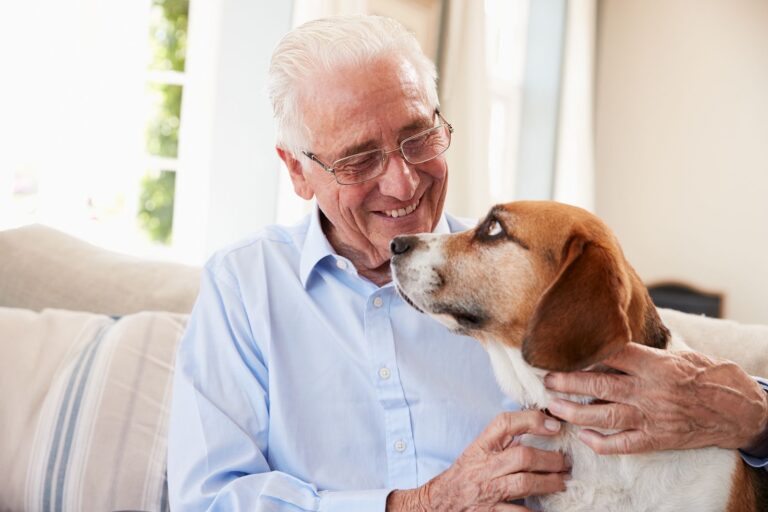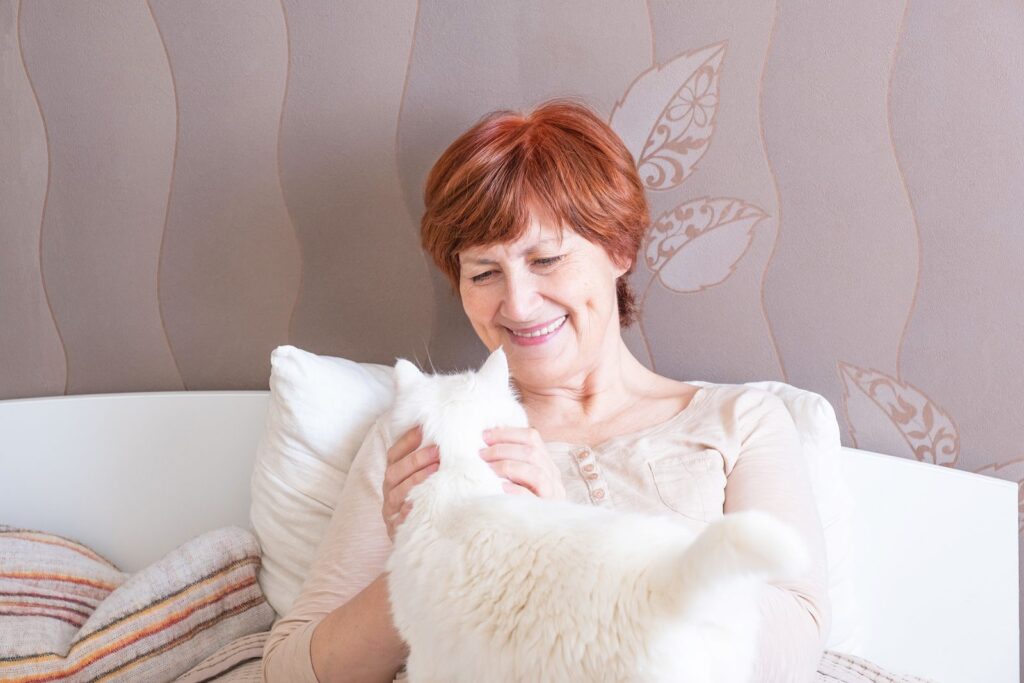
Coping with the Loss of a Pet
People who love pets think of them as part of the family. After all, a pet offers unconditional love that knows no boundaries. A beloved animal can fill the role of best friend, confidant, and comforter. A pet is always there to share its love with you and pick you up or make you smile when you are down.
For pet lovers, saying goodbye to a cherished pet can be as devastating as losing a human family member. The sorrow and loss you feel when a pet dies may be unexpectedly intense and even overwhelming. It’s perfectly okay and normal to have these feelings. And it’s important to let yourself feel them. Remember, the death of a pet is a serious event in your life. Do not expect to move on without going through the grieving process.
Losing a pet can be even harder for older pet owners. Those of us in our seasoned years may have experienced the loss of important people in our lives who also had a connection to the pet. The death of the pet can easily bring back the memories and pain of losing those people as well. Older pet owners who live alone may come to depend heavily upon their pets to stave off feelings of loneliness and isolation, which makes losing them especially difficult.
Of course, the grieving process is unique to each individual. It may be more difficult for some people than for others. It may take longer for some than others. Very often, grieving a pet involves the same stages of grief experienced when grieving another person, such as denial, guilt, anger, and acceptance. Working through each stage brings you closer to the light at the end of the tunnel.
Let grief happen naturally, in whatever way feels right and healthy for you. Just make sure to acknowledge your loss and the serious impact that the loss may have on your life. Allow yourself to feel and work through all the emotions evoked by the loss. It might be difficult to even think about your pet at first, but you will get to a place where it becomes easier to look back at everything you shared with your pet with a sense of joy and appreciation… and far less pain.
We hope the following tips are of help to our visitors who are grieving a pet.
A few helpful suggestions…
- If possible, say goodbye to your pet. If you are aware that your pet’s health is declining and the end is probably getting close, give yourself opportunities to show your appreciation to your pet and say your goodbyes. Look into your pet’s eyes and tell the animal how you feel. Pets often comprehend much more than we give them credit for understanding.
- It is okay to be sad. It is okay to cry. It is okay to let other people see your grief. Some folks in your life may not understand what you’re going through… and that’s okay. People who react to a pet owner’s grief with a statement something like “it’s only a pet” just do not “get it.” They may never have known the special bond of loving and being loved that you experienced with your pet.
- Don’t second guess your actions or decisions. People sometimes feel guilty about the death of a pet, especially when it comes to putting an animal “to sleep” or euthanasia. After the pet’s death, they may start wondering if they did the right thing or if they could have somehow kept the animal alive longer. Don’t let yourself fall into this trap. You loved your pet and you made decisions you felt were best for you pet. Although your pet couldn’t communicate with you, the odds are very high that the pet might thank you for the difficult decision you made.
- Talk about your pet with people who care. Sharing your grief with others who knew and cared about your pet can help make the grieving process feel less lonely. Reminiscing about all the positive memories you share of your pet can help take your mind off the pain of your loss and allow you to focus more attention on your pet’s life and the joy the animal added to yours.
- Take care of yourself. When you are grieving and sad, it can be very easy to forget about yourself and your needs. It is important to get plenty of rest, eat well, stay hydrated, and exercise appropriately. If you took your pet for a walk every day, continue taking those walks for the health benefits walking provides. If following the same route is too difficult because of all the memories that come up along the way, try taking a different route with new scenery.
- Never hesitate to seek out support if you need it. You may be surprised to learn there are bereavement counselors who specialize in helping people deal with the pain of losing pets. If you feel overwhelmed by the loss of your pet, please let your doctor know and/or contact a pet bereavement counselor. There also are pet loss support groups where pet owners share their experiences and support each other. Your local humane society or your veterinarian should be able to help you find one. There are books about dealing with the loss of a pet that you can take out or download from your local library or purchase online or at a bookstore. The Internet has many helpful resources as well, like online support groups, articles, and videos.
- Commemorate your pet. Holding some kind of farewell ceremony or memorial for a pet can be therapeutic for some people. If that is not something you would choose to do, there are plenty of other ways to celebrate your pet’s life. You could plant a tree or garden in your pet’s honor. You may want to write a story or poem about your pet or put together a photo album, collage, or scrapbook spotlighting the animal. Some people like to make a donation to a local animal shelter in their pet’s name to help other animals find loving homes.
- Don’t try to replace your pet too soon. It can be tempting to try to fill the void your pet has left behind, but it’s often best to give yourself some time to grieve before rushing out and getting a new pet. Every pet should be looked at as a unique addition to your life, not as a substitute for a pet that is no longer with you. Think about the reasons you want a new pet, as well as all the work, responsibilities, and expenses that come with a pet. It’s especially important for older pet owners to think about what a new pet would mean. When it comes to lifespan, a puppy may have the potential to outlive you if you are in your later years, but an adopted, already trained older dog might be the perfect companion.


Age Adds Flavor
We are not old, we are seasoned!
Don’t forget to visit us on FACEBOOK!
